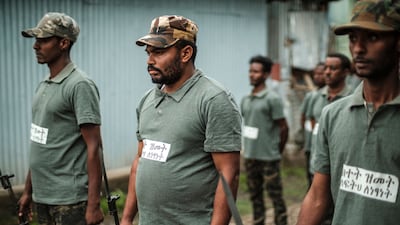UN Secretary General Antonio Guterres warned on Thursday of the “mass mobilisation” of armed forces in Ethiopia’s widening civil war, as the conflict threatens to fragment an ethnically diverse nation of 110 million people.
The UN chief said the conflict, which began in the northern Tigray region in November, has spilt into the nearby Amhara and Afar regions, “tearing apart” the 10 ethnic groups that dominate Africa’s second-most populous nation.
His comments to the UN Security Council came amid reports of more than 200 killings in recent days in the Oromia region, which has so far been spared the violence further north, but where local rebels recently announced plans to ally with Tigrayan insurgents.
“Other actors in Ethiopia have entered the fight through mass mobilisation and the activation of regional armed groups,” Mr Guterres said.
“Inflammatory rhetoric and ethnic profiling are tearing apart the social fabric of the country.”
A generation of young Ethiopians is being “instrumentalised and mobilised” to take up arms against countrymen and pursue a “path of division and destruction”, said the UN chief.
“They will be the ultimate casualties in this needless conflict,” he added.
He called for Ethiopia’s warring factions to lay down their guns, begin peace talks and let aid reach the two million displaced Ethiopians and some 400,000 people who have been pushed into famine-like conditions by the spiralling conflict.
The Ethiopian Human Rights Commission, a state-affiliated but independent body, said on Thursday that at least 210 people were killed over several days of ethnic violence in Ethiopia's Oromia region last week.
The commission said witnesses described gunmen connected with the Oromo Liberation Army (OLA), a rebel group, arriving on August 18 after security forces withdrew from Gida-Kirimu. The OLA has denied responsibility for the attacks.
This month, the OLA and the Tigrayan rebels announced they had reached an agreement to fight together against Prime Minister Abiy Ahmed’s forces and his allies. Both groups have been designated as terrorists by Mr Abiy’s government.
Fighting started in Ethiopia after a fallout between Mr Abiy and the leaders of Tigray, who dominated Ethiopia’s government for nearly three decades.
Mr Abiy in November sent troops to topple the ruling Tigray People's Liberation Front (TPLF), accusing the group of staging attacks on army camps.
The Nobel Peace Prize winner declared victory within weeks after government forces took the Tigrayan capital, but TPLF leaders remained on the run and fighting continued.
In a stunning reversal of the conflict in late June, pro-TPLF forces re-entered Mekelle, the regional capital. Mr Abiy declared a unilateral ceasefire and the army mostly pulled out of Tigray.
Tigrayan rebels have since pushed into Amhara and Afar.
Akshaya Kumar, a campaigner from the group Human Rights Watch, said the Security Council was sitting “on the sidelines” while Mr Abiy’s government “choked off food aid to Tigray” and armed groups abused civilians.
“The Security Council needs to take action, such as by making a diplomatic trip to the affected regions and imposing sanctions on individual abusers,” said Ms Kumar.







